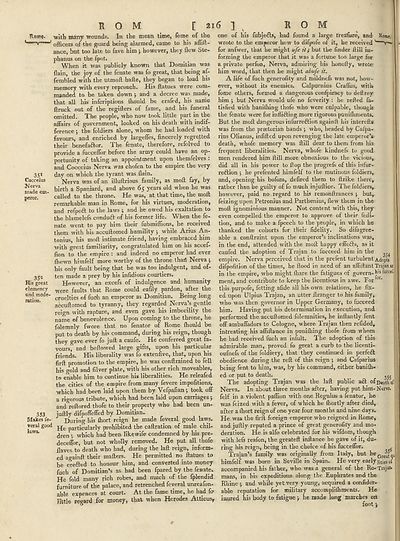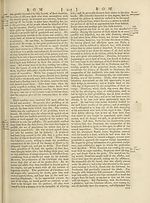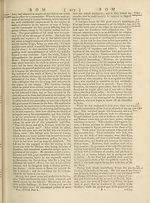Encyclopaedia Britannica, or, a Dictionary of arts, sciences, and miscellaneous literature : enlarged and improved. Illustrated with nearly six hundred engravings > Volume 18, RHI-SCR
(224) Page 216
Download files
Complete book:
Individual page:
Thumbnail gallery: Grid view | List view

tloiw*.
35*
Cocceius
Nerva
made em¬
peror.
. 352
His great
clemency
end mode¬
ration.
353
Makes fe-
veral good
laws.
ROM [2i
■with many wounds. In the mean time, iome of the
officers of the guard being alarmed, came to his affift-
ance, but too late to fave him j however, they flew Ste¬
phanas on the fpot*
When it was publicly known that Domitian was
{lain, the joy of the fenate was fo great, that being af-
fembled with the utmoft halte, they began to load his
memory with every reproach. His ftatues were com¬
manded to be taken down y and a decree was made,
that all his infcriptions ffiould be erafed, his name
{truck out of the regifters of fame, and his funeral
omitted. The people, who now took little part in the
affairs of government, looked on his death with indif¬
ference } the foldiers alone, whom he had loaded with
favours, and enriched by largeffes, fincerely regretted
their benefa&or. The fenate, therefore, refolved to
provide a fucceffor before the army could have an op¬
portunity of taking an appointment upon themfelves :
and Cocceius Nerva was chofen to the empire the very
day on which the tyrant was {lain.
Nerva was of an illuftrious family, as moft fay, by
birth a Spaniard, and above 65 years old when he was
called to the throne. He was, at that time, the moft
remarkable man in Rome, for his virtues, moderation,
and refpeft to the laws ; and he owed his exaltation to
the blamelefs conduft of his former life. When the fe¬
nate went to pay him their fubmiffions, he received
them with his accuftomed humility ; while Arius An-
tonius, his moft intimate friend, having embraced him
with great familiarity, congratulated him on his accef-
fion to the empire : and indeed no emperor had ever
(hewn hhnfelf more worthy of the throne thari Nerva *,
his only fault being that he was too indulgent, and of¬
ten made a prey by his infxdious courtiers.
However, an excefs of indulgence and humanity
were faults that Rome could eafily pardon, after the
cruelties of fuch an emperor as Domitian. Being long
accuftomed to tyranny, they regarded Nerva’s gentle
reign with rapture, and even gave his imbecility the
name of benevolence. Upon coming to the throne, he
folemnly fwore that no fenator of Rome ftiould be
put to death by his command, during his reign, though
they gave ever fo juft a caufe. He conferred great fa¬
vours, and beftowed large gifts, upon his particular
friends. His liberality was fo extenfive, that, upon his
firft promotion to the empire, he was conftrained to fell
his gold and filver plate, with his other rich moveables,
to enable him to continue his liberalities. He releafed
the cities of the empire from many fevere impofitions,
which had been laid upon them by Vefpafian *, took off
a rigorous tribute, which had been laid upon carriages j
and reftored thofe to their property who had been un-
juftly difpoffeffed by Domitian.
During his ffiort reign he made feveral good laws.
He particularly prohibited the caftration of male chil¬
dren •, which had been likewife condemned by his pre-
deceffor, but not wholly removed. He put all thofe
Haves to death who had, during the laft reign, inform¬
ed againft their mafters. He permitted no ftatues to
be ere&ed to honour him, and converted into money
fuch of Domitian’s as had been fpared by the fenate.
He fold many rich robes, and much of the fplendid
furniture of the palace, and retrenched feveral unreafon-
able expences at court. At the fame time, he had fo
little regard for money, that when Herodes Atticusy
6 ] ROM
one of his fubje£ls, had found a large treafure, and Romr,
wrote to the emperor how to difpofe of it, he received ■V-*'
for anfvver, that he might u/e it} but the finder ftill in¬
forming the emperor that it was a fortune too large for
a private perfon, Nerva, admiring his honefty, wrote
him word, that then he might abufe it.
A life of fuch generofity and mildnefs was not, how¬
ever, without its enemies. Calpurnius Craffus, with
fome others, formed a dangerous confpiraey to deftroy
him *, but Nerva would ufe no feverity : he refted fa-
tisfied with banifhing thofe who were culpable, though
the fenate were for inffifting more rigorous puniihments.
But the moft dangerous infurre&ion againft his interefts
was from the praetorian bands ; who, headed by Caipa-
rius Olianus, infilled upon revenging the late emperor’s
death, whofe memory was ftill dear to them from his
frequent liberalities. Nerva, whofe kindnefs to good
men rendered him ftill more obnoxious to the vicious,
did all in his power to flop the progrefs of this infur-
reftion 5 he prefented himfelf to the mutinous foldiers,
and, opening his bofom, defired them to ftrike there,
rather than be guilty of fo much injuftice. The foldiers,
however, paid no regard to his remonftrances ; but,
feizing upon Petronius and Parthenius, flew them in the
moft ignominious manner. Not content with this, they
even compelled the emperor to approve of their {'edi¬
tion, and to make a fpeech to the people, in which he
thanked the cohorts for their fidelity. So difagree-
able a conftraint upon the emperor’s inclinations was,
in the end, attended with the moft happy effedls, as it
caufed the adoption of Trajan to fucceed him in the ^
empire. Nerva perceived that in the prefent turbulent Adopts
difpofition of the times, he flood in need of an affiftant Trajan u
in the empire, who might lhare the fatigues of govern-|?,s lucce!'
ment, and contribute to keep the licentious in awe. Forlor’
this purpofe, fetting afide all his own relations, he fix¬
ed upon Ulpius Trajan, an utter ftranger to his family,
who was then governor in Upper Germany, to fucceed
him. Having put his determination in execution, and
performed the accuftomed folemnities, he inftantly fent
off ambaffadors to Cologne, where Trajan then refided,
intreating his affiftance in puniftiing thofe from whom
he had received fuch an infult. The adoption of this
admirable man, proved fo great a curb to the licenti-
oufnefs of the foldiery, that they continued in perfeft
obedience during the reft of this reign ; and Gafparius
being fent to him, was, by his command, either baniftr-
ed or put to death.
The adopting Trajan was the laft public a& of;Deathe}'
Nerva. In about three months after, having put him- Nerva.
felf in a violent paflion with one Regulus a fenator, he
was feized with a fever, of which he (hortly after died,
after a fhort reign of one year four months and nine days.
He was the firft foreign emperor who reigned in Rome,
and juftly reputed a prince of great generofity and mo¬
deration. He is alfo celebrated for his wifdom, though
with left reafon, the greateft inftance he gave of it, du¬
ring his reign, being in the choice of his fucceffor.
Trajan’s family was originally from Italy, but he Gre^qu
himfelf was born in Seville in Spain. He very early iities of
accompanied his father, who was a general of the Ro-Trajan,
mans, in his expeditions along the Euphrates and the
Rhine *, and while yet very young, acquired a confider-
able reputation for military accompliftiments- He
inured his body to fatigue j he made long marches on
foot
35*
Cocceius
Nerva
made em¬
peror.
. 352
His great
clemency
end mode¬
ration.
353
Makes fe-
veral good
laws.
ROM [2i
■with many wounds. In the mean time, iome of the
officers of the guard being alarmed, came to his affift-
ance, but too late to fave him j however, they flew Ste¬
phanas on the fpot*
When it was publicly known that Domitian was
{lain, the joy of the fenate was fo great, that being af-
fembled with the utmoft halte, they began to load his
memory with every reproach. His ftatues were com¬
manded to be taken down y and a decree was made,
that all his infcriptions ffiould be erafed, his name
{truck out of the regifters of fame, and his funeral
omitted. The people, who now took little part in the
affairs of government, looked on his death with indif¬
ference } the foldiers alone, whom he had loaded with
favours, and enriched by largeffes, fincerely regretted
their benefa&or. The fenate, therefore, refolved to
provide a fucceffor before the army could have an op¬
portunity of taking an appointment upon themfelves :
and Cocceius Nerva was chofen to the empire the very
day on which the tyrant was {lain.
Nerva was of an illuftrious family, as moft fay, by
birth a Spaniard, and above 65 years old when he was
called to the throne. He was, at that time, the moft
remarkable man in Rome, for his virtues, moderation,
and refpeft to the laws ; and he owed his exaltation to
the blamelefs conduft of his former life. When the fe¬
nate went to pay him their fubmiffions, he received
them with his accuftomed humility ; while Arius An-
tonius, his moft intimate friend, having embraced him
with great familiarity, congratulated him on his accef-
fion to the empire : and indeed no emperor had ever
(hewn hhnfelf more worthy of the throne thari Nerva *,
his only fault being that he was too indulgent, and of¬
ten made a prey by his infxdious courtiers.
However, an excefs of indulgence and humanity
were faults that Rome could eafily pardon, after the
cruelties of fuch an emperor as Domitian. Being long
accuftomed to tyranny, they regarded Nerva’s gentle
reign with rapture, and even gave his imbecility the
name of benevolence. Upon coming to the throne, he
folemnly fwore that no fenator of Rome ftiould be
put to death by his command, during his reign, though
they gave ever fo juft a caufe. He conferred great fa¬
vours, and beftowed large gifts, upon his particular
friends. His liberality was fo extenfive, that, upon his
firft promotion to the empire, he was conftrained to fell
his gold and filver plate, with his other rich moveables,
to enable him to continue his liberalities. He releafed
the cities of the empire from many fevere impofitions,
which had been laid upon them by Vefpafian *, took off
a rigorous tribute, which had been laid upon carriages j
and reftored thofe to their property who had been un-
juftly difpoffeffed by Domitian.
During his ffiort reign he made feveral good laws.
He particularly prohibited the caftration of male chil¬
dren •, which had been likewife condemned by his pre-
deceffor, but not wholly removed. He put all thofe
Haves to death who had, during the laft reign, inform¬
ed againft their mafters. He permitted no ftatues to
be ere&ed to honour him, and converted into money
fuch of Domitian’s as had been fpared by the fenate.
He fold many rich robes, and much of the fplendid
furniture of the palace, and retrenched feveral unreafon-
able expences at court. At the fame time, he had fo
little regard for money, that when Herodes Atticusy
6 ] ROM
one of his fubje£ls, had found a large treafure, and Romr,
wrote to the emperor how to difpofe of it, he received ■V-*'
for anfvver, that he might u/e it} but the finder ftill in¬
forming the emperor that it was a fortune too large for
a private perfon, Nerva, admiring his honefty, wrote
him word, that then he might abufe it.
A life of fuch generofity and mildnefs was not, how¬
ever, without its enemies. Calpurnius Craffus, with
fome others, formed a dangerous confpiraey to deftroy
him *, but Nerva would ufe no feverity : he refted fa-
tisfied with banifhing thofe who were culpable, though
the fenate were for inffifting more rigorous puniihments.
But the moft dangerous infurre&ion againft his interefts
was from the praetorian bands ; who, headed by Caipa-
rius Olianus, infilled upon revenging the late emperor’s
death, whofe memory was ftill dear to them from his
frequent liberalities. Nerva, whofe kindnefs to good
men rendered him ftill more obnoxious to the vicious,
did all in his power to flop the progrefs of this infur-
reftion 5 he prefented himfelf to the mutinous foldiers,
and, opening his bofom, defired them to ftrike there,
rather than be guilty of fo much injuftice. The foldiers,
however, paid no regard to his remonftrances ; but,
feizing upon Petronius and Parthenius, flew them in the
moft ignominious manner. Not content with this, they
even compelled the emperor to approve of their {'edi¬
tion, and to make a fpeech to the people, in which he
thanked the cohorts for their fidelity. So difagree-
able a conftraint upon the emperor’s inclinations was,
in the end, attended with the moft happy effedls, as it
caufed the adoption of Trajan to fucceed him in the ^
empire. Nerva perceived that in the prefent turbulent Adopts
difpofition of the times, he flood in need of an affiftant Trajan u
in the empire, who might lhare the fatigues of govern-|?,s lucce!'
ment, and contribute to keep the licentious in awe. Forlor’
this purpofe, fetting afide all his own relations, he fix¬
ed upon Ulpius Trajan, an utter ftranger to his family,
who was then governor in Upper Germany, to fucceed
him. Having put his determination in execution, and
performed the accuftomed folemnities, he inftantly fent
off ambaffadors to Cologne, where Trajan then refided,
intreating his affiftance in puniftiing thofe from whom
he had received fuch an infult. The adoption of this
admirable man, proved fo great a curb to the licenti-
oufnefs of the foldiery, that they continued in perfeft
obedience during the reft of this reign ; and Gafparius
being fent to him, was, by his command, either baniftr-
ed or put to death.
The adopting Trajan was the laft public a& of;Deathe}'
Nerva. In about three months after, having put him- Nerva.
felf in a violent paflion with one Regulus a fenator, he
was feized with a fever, of which he (hortly after died,
after a fhort reign of one year four months and nine days.
He was the firft foreign emperor who reigned in Rome,
and juftly reputed a prince of great generofity and mo¬
deration. He is alfo celebrated for his wifdom, though
with left reafon, the greateft inftance he gave of it, du¬
ring his reign, being in the choice of his fucceffor.
Trajan’s family was originally from Italy, but he Gre^qu
himfelf was born in Seville in Spain. He very early iities of
accompanied his father, who was a general of the Ro-Trajan,
mans, in his expeditions along the Euphrates and the
Rhine *, and while yet very young, acquired a confider-
able reputation for military accompliftiments- He
inured his body to fatigue j he made long marches on
foot
Set display mode to:
![]() Universal Viewer |
Universal Viewer | ![]() Mirador |
Large image | Transcription
Mirador |
Large image | Transcription
Images and transcriptions on this page, including medium image downloads, may be used under the Creative Commons Attribution 4.0 International Licence unless otherwise stated. ![]()
| Permanent URL | https://digital.nls.uk/193021619 |
|---|
| Attribution and copyright: |
|
|---|
| Description | Ten editions of 'Encyclopaedia Britannica', issued from 1768-1903, in 231 volumes. Originally issued in 100 weekly parts (3 volumes) between 1768 and 1771 by publishers: Colin Macfarquhar and Andrew Bell (Edinburgh); editor: William Smellie: engraver: Andrew Bell. Expanded editions in the 19th century featured more volumes and contributions from leading experts in their fields. Managed and published in Edinburgh up to the 9th edition (25 volumes, from 1875-1889); the 10th edition (1902-1903) re-issued the 9th edition, with 11 supplementary volumes. |
|---|---|
| Additional NLS resources: |
|

